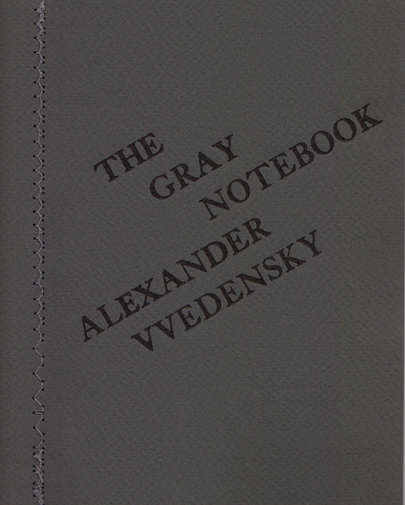
The Gray Notebook (4th edition)
Alexander Vvedensky
Translated by Matvei Yankelevich
January 2002
UDP offers what is as close to a piece of this history as we can likely get.
Karla Kelsey
Now in its fourth printing (previously printed in 2002, 2003, 2009) the work presented here (in its entirety) has come to be called the “gray notebook”, simply because of its color. Vvedensky wrote in this notebook in 1932-1933, soon after returning to Leningrad from his exile in Kursk. Two loose sheets with short prose pieces were found inside the notebook and are included here as inserts.
About the Author
Alexander Vvedensky (1904-1941) studied art and poetry under the Russian Futurists in Leningrad during the early nineteen-twenties, a liberal period of Soviet power. He banded together with Daniil Kharms and others to form various avant-garde groups dedicated to theater, poetry and general troublemaking, all of which culminated in the formation of the OBERIU (Union of Real Art) in 1928.
The OBERIU found itself increasingly attacked in the press and in late 1931, its key members were arrested on charges of being involved in an “anti-soviet group of children’s writers.” Vvedensky and Kharms spent several months in prison and were then exiled until the end of 1932. There would be no more OBERIU performances, and no hope of publication, except for sporadic poems and translations in magazines and books for children.
In the mid-thirties, Vvedensky left Leningrad for a quieter life in Kharkov. He died—or was killed—during the evacuation of the Ukraine in 1941. His poetry was not published in Russia until the period of glasnost. Much of Vvedensky’s work comes down to us from Kharms’s archives (a suitcase that, after Kharms’s arrest in 1941, was in the safe-keeping of their mutual friend, Iakov Druskin.) And, of course, some of his writings have been lost.
—from the Translator’s Note (by Matvei Yankelevich)
Praise
UDP offers what is as close to a piece of this history as we can likely get.
Karla Kelsey, Constant Critic
These poems do what solid poems should. They stand against time.
Peter Moysaenko, BOMBLOG
About the Translator
Matvei Yankelevich is a founding member of the Ugly Duckling Presse editorial collective and has curated UDP’s Eastern European Poets Series since 2002, and was a co-editor of 6×6 (2000-2017). His most recent book of poetry is Some Worlds for Dr. Vogt (Black Square). His co-translation (with Eugene Ostashevsky) of Alexander Vvedensky’s An Invitation for Me to Think (NYRB Poets), received a National Translation Award. His translations of Daniil Kharms were collected in Today I Wrote Nothing: The Selected Writings of Daniil Kharms (Ardis/Overlook). He has been awarded fellowships from the National Endowment for the Arts, the New York Foundation for the Arts, and the National Endowment for Humanities. He teaches translation and book arts at Columbia University’s School of the Arts.
In the News
Links
Publication Details
Hand-bound. 24 pp, 6 x 7 in
Publication Date: January 01 2002
Series: Eastern European Poets Series